Unit 10You’re supposed to shake hands Section B (2a-Self Check)课件(共56张PPT)
文档属性
| 名称 | Unit 10You’re supposed to shake hands Section B (2a-Self Check)课件(共56张PPT) | 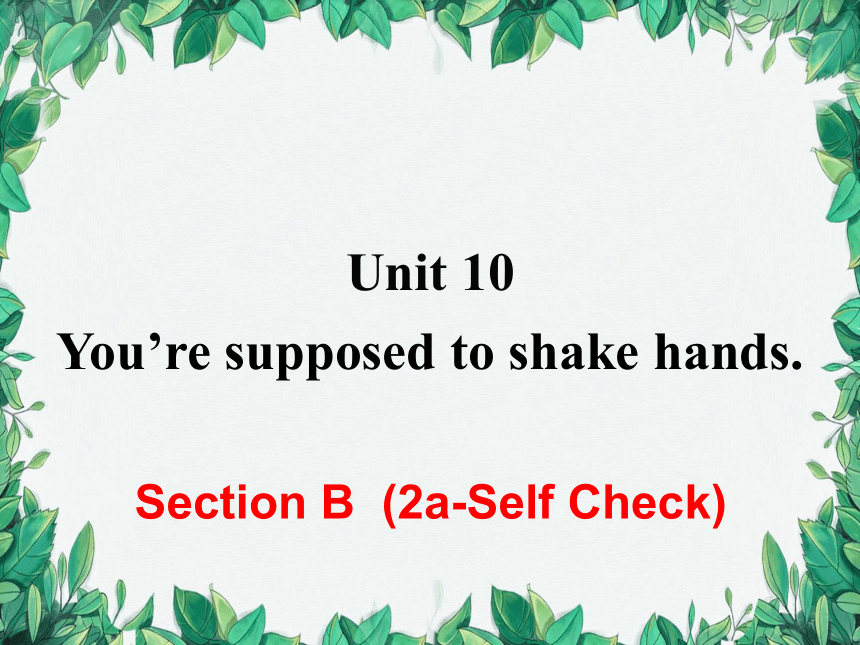 | |
| 格式 | ppt | ||
| 文件大小 | 2.7MB | ||
| 资源类型 | 教案 | ||
| 版本资源 | 人教新目标(Go for it)版 | ||
| 科目 | 英语 | ||
| 更新时间 | 2023-08-03 21:30:01 | ||
图片预览

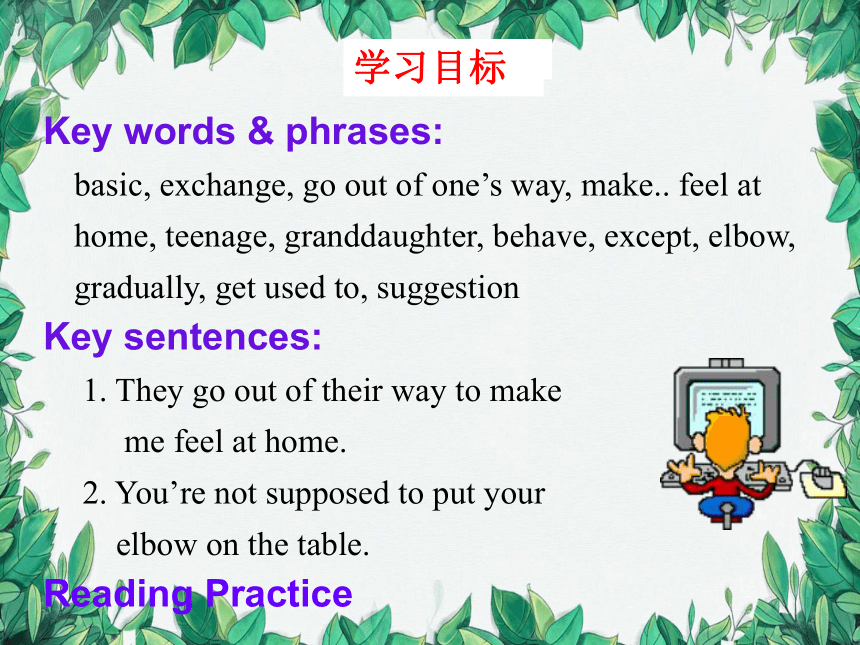
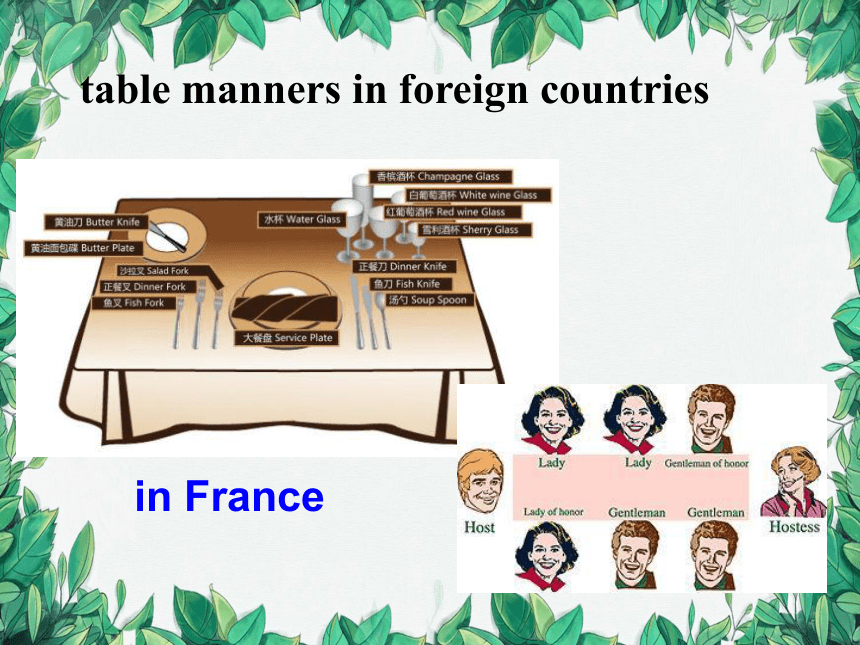
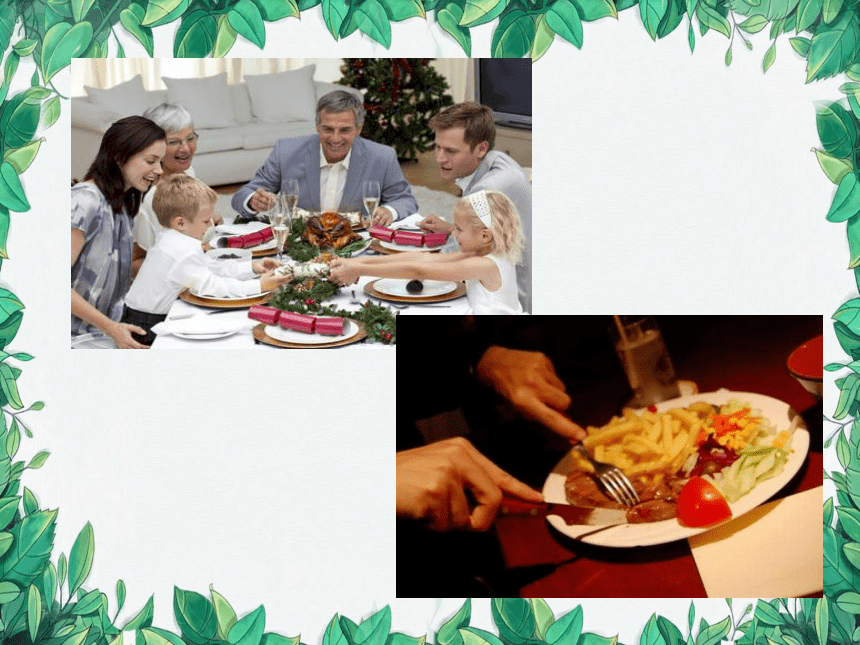
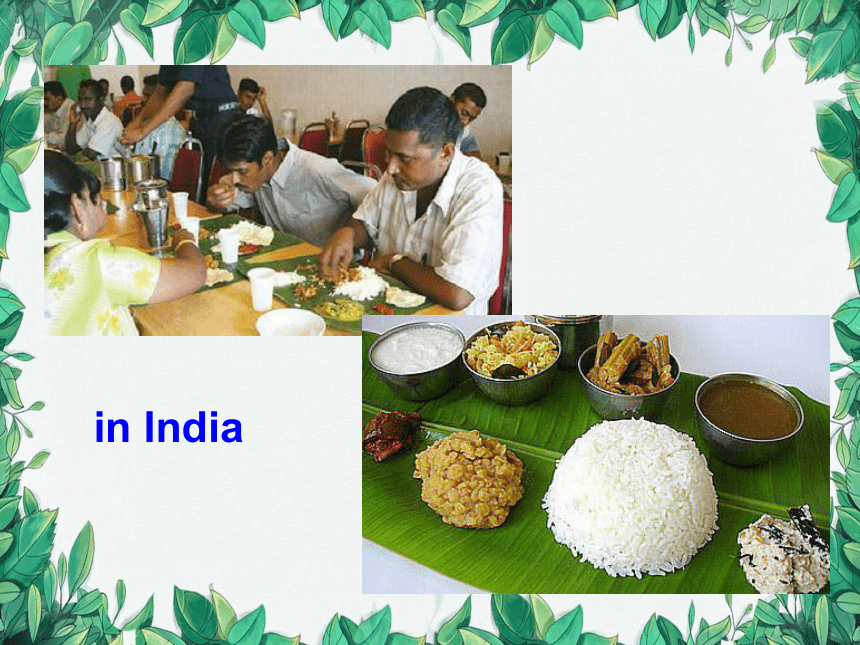

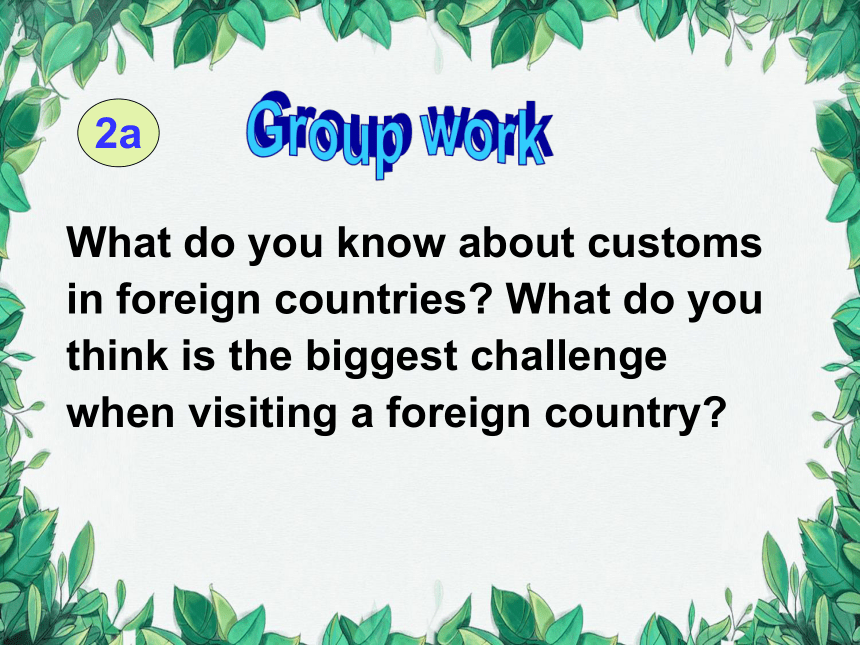


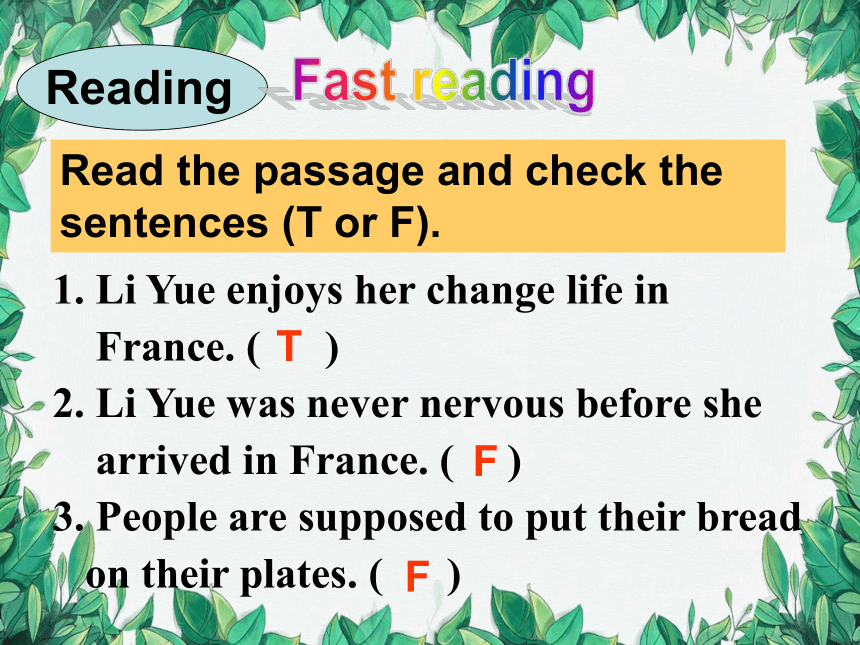
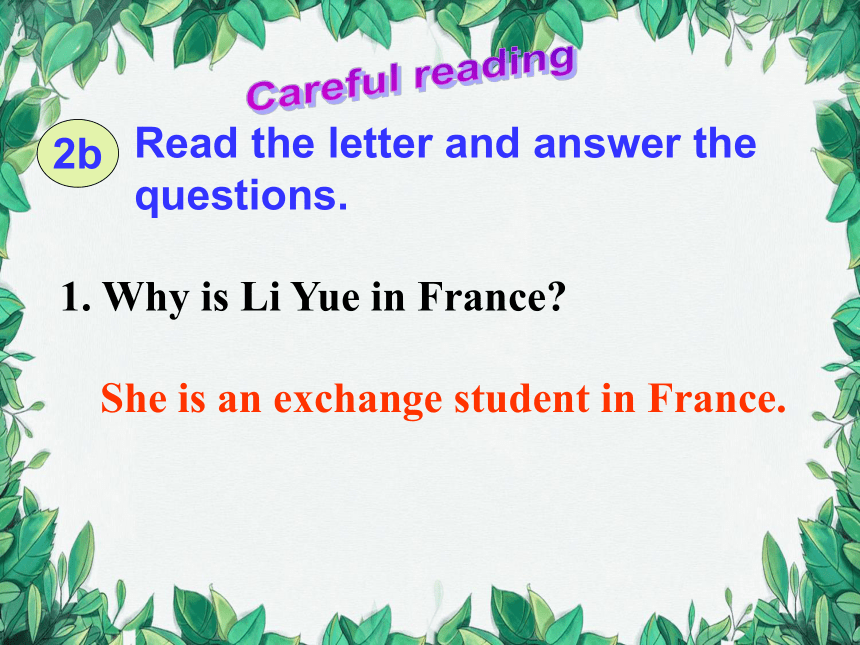
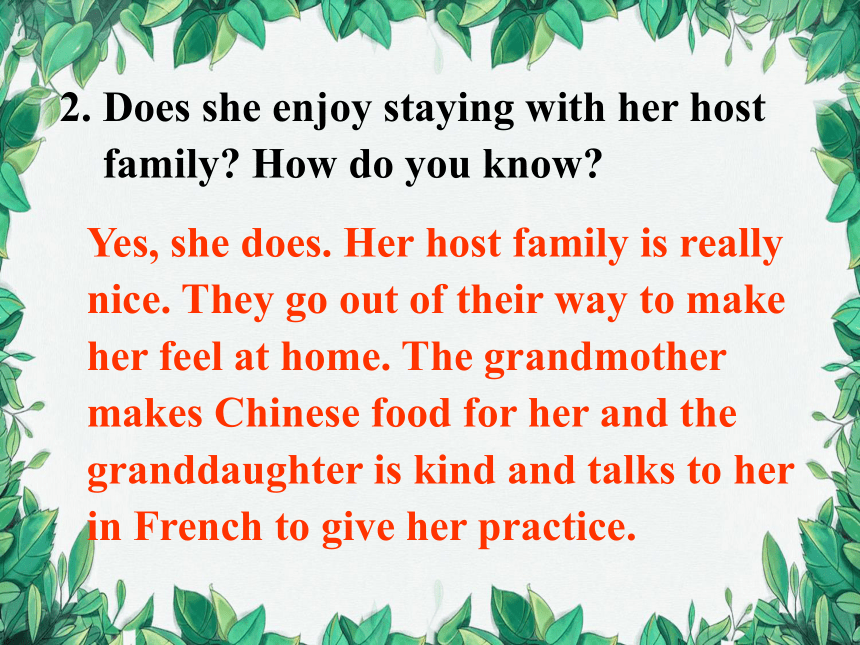
文档简介
(共56张PPT)
Section B (2a-Self Check)
Unit 10
You’re supposed to shake hands.
学习目标
Key words & phrases:
basic, exchange, go out of one’s way, make.. feel at
home, teenage, granddaughter, behave, except, elbow,
gradually, get used to, suggestion
Key sentences:
1. They go out of their way to make
me feel at home.
2. You’re not supposed to put your
elbow on the table.
Reading Practice
table manners in foreign countries
in France
in India
in China
2a
What do you know about customs in foreign countries What do you think is the biggest challenge when visiting a foreign country
e.g. My cousin went to America, and she said that learning basic table manners was her biggest challenge. She never knew what she was supposed to do
at the dinner table.
Can they eat fruit with their hands
1. Li Yue enjoys her change life in
France. ( )
2. Li Yue was never nervous before she
arrived in France. ( )
3. People are supposed to put their bread on their plates. ( )
Reading
Read the passage and check the sentences (T or F).
T
F
F
Read the letter and answer the questions.
2b
1. Why is Li Yue in France
She is an exchange student in France.
2. Does she enjoy staying with her host
family How do you know
Yes, she does. Her host family is really nice. They go out of their way to make her feel at home. The grandmother makes Chinese food for her and the granddaughter is kind and talks to her in French to give her practice.
3. How does she feel about making mistakes when she speaks French
4. What is the biggest challenge she is facing
It doesn’t worry her as it used to.
Her biggest challenge is how to behave at the dinner table.
REVIEWING
Taking notes or summarizing the main ideas can help you move language from your short-term to long-term memory.
阅读技巧点拨
1. 阅读过程中对于不认识的生词或短语,要学会根据上下文或已经学过的知识猜测意思。
2. 对于以what、who、which、when、where、how或者why等词引导,就文中某句、某段或某一具体细节进行提问并要求回答,正确理解题干和信息句的意义是关键。速读全文,抓住中心主旨,应尽可能多地捕获信息材料。
细读题材,各个击破。阅读时,要有较强的针对性。对于捕获到的信息,要做认真分析,仔细推敲,理解透彻,只有这样,针对题目要求,才能做到稳、准。
2c
★ Guess the words you don’t know when you read the passage.
★ Read the sentences and replace the underline words with the phrases in the box.
1. Making mistakes in French used to make Lin Yue nervous.
2. It was quite hard for her to feel good about speaking French.
3. The host family tried
very hard to help Lin
Yue.
4. Lin Yue has slowly learned how to be like her French friends. ● went out of their way
● be comfortable (doing)
● gradually gotten used to being
● (something) worry (someone)
Review the passage and make notes about French customs in the chart.
Dos Don’ts
You’re expected to put your bread on the table.
… You are not supposed to put your bread on your plate.
…
2d
Dos
You’re expected to put your bread on the table.
You’re expected to cut up your fruit and eat it with a fork.
You’re expected to say “That was delicious” if you don’t want any more food.
Don’ts
You are not supposed to put your bread on your plate.
You are not supposed to eat anything with your hands except bread.
You’re not supposed to say you are full.
You are not supposed to put your elbows on the table.
1. They go out of their way to make me feel at home.
go out of one’s way 特地;格外努力
e.g. John went out of his way to make
his girl friend happy.
约翰想方设法使他的女朋友高兴。
make sb. feel at home 使某人感到宾至如归
e.g. I’m doing everything I can to make
them feel at home.
我在尽我一切所能使他们感到宾至
如归。
2. You wouldn’t believe how quickly my French has improved because of that.
You wouldn’t believe …是一个常用句式,相当于汉语所说的“你无法想象……;你想都想不到……;你绝不会相信……”,表示所陈述的事情超出想象之外。与此类似的表达还有You would never believe…或You would hardly believe…。
e.g.
You wouldn’t believe that he found his long-lost sister in Taiwan!
你绝对想不到他在台湾找到了失散多年的姐姐!
You would never believe what quick progress he’s made ever since he attended your class.
你根本无法想象,自从他听了您的讲课后进步有多大。
3. My biggest challenge is learning how to behave at the dinner table.
learning how to behave at the table是现在分词短语,在此用作句子的表语。e.g.
His main hobby is fishing.
他的主要爱好是钓鱼。
The most important thing is getting there in time. 最重要的事是及时到达那里。
behave
不及物动词,意为“表现;行为”;
behave well / badly表示“表现好/糟糕”。
名词形式: behavior “举止;行为”,
是不可数名词。
【运用】请根据汉语意思补全英语句
子,每空一词。
(1) 如果你那样表现,你会让人厌恶的。
____ you _______ like that, you’ll get yourself disliked.
(2) 如此的行为可能招致麻烦。
_____ _________ may cause trouble.
If behave
Such behavior
4. … but I’m gradually getting used to it. get used to 习惯于
e.g. We get used to this way of
speaking.
我们习惯了这种说话方式。
① be/get used to sth./doing sth. 习惯于…
e.g. He got used to living in the
country.
他习惯住在乡下。
② used to do sth. 过去常常做某事(现
在不做了)
e.g. He used to plant roses.
他过去常常种植玫瑰。
辨析
5. Another example is that you’re not supposed to eat anything with your hand except bread, not even fruit.
except作介词,意为“除……之外”,和but意义相似,但语气上要比but更加强烈。
1) Everyone is here except him.
2) We have classes except Saturday and Sunday.
通过观察例句1和例句2,我们可知except后可以跟 ______ 和 ______。
3) I can take a holiday at any time except in September.
通过观察例句3,可知,except后也可跟__________。
代词
名词
介词短语
4) He never came to visit except to borrow something.
5) He will do anything except lend you money.
通过观察例句4,可知except后可接动词不定式。意思是“除了做……”。但在例句5中except后为“lend you money”,所以我们可知若except前含不定代词时,就要______________________。
省略动词不定式的标志to
【运用】将下列汉语句子翻译成英语。
1. 除了烹饪,她别的都会干。
_______________________________
2. 我除了要通过考试之外,没有别的心愿。
________________________________
____________
She can do everything except cook.
I have no other wish except to pass the examination.
1. Compare the table manners in France and China in your group. How are they the same or different Make a list.
2. Share your ideas with your class.
e.g. In France, people put their bread on the table. But in China, we always put our food on a plate or in a bowl. We never put food on the table.
2e
Table manners It’s polite/impolite to…
House rules You’re supposed/not supposed to…
Going out with people You should…
Your pen pal is coming to China on an exchange program. He/She is asking you about Chinese customs and what he/she is supposed to do or not. Make notes in the chart.
3a
Table manners
It’s polite to ask older people to start eating first at the table.
It’s not polite to pick up your bowl to eat.
You’re supposed to use chopsticks to eat.
It’s not polite to stick your chopsticks into your food.
It’s impolite to point at anyone with your chopsticks.
It’s impolite to knock your empty bowl with your chopsticks.
…
◆ You’re supposed to greet the host family.
◆ You’re supposed to shake hands with people.
◆ You’re supposed to say “nihao” to people.
◆ You’re not supposed to bow, kiss or hug with people.
◆ …
House rules
You should call first.
You should make a going-out plan with friends.
…
Going out with people
Write a letter to your pen pal to give him/her advice and suggestions on how to behave properly in China.
3b
写作技巧点拨:
1) 英语书信的写法:
称呼Dear…, 左起顶格写。
正文换行,也要顶格写,是信的核心部分。因此要求正文层次分明、简单易懂。
祝福的话语, 正文下换行,顶格写, 如: Best wishes! Take care! Happy New Year! Happy Birthday! 等。
结束语在正文下面的一、二行处,第一个词开头要大写,句末用逗号。结束语的写法 Yours, Your loving…, Sincerely yours、Yours sincerely或Sincerely;在结尾语下面的署名必须亲自签名,也不加任何的标点符号。
2) Useful expressions:
有关文化礼仪的写作常用句型
You’re (not) supposed to….
You are expected to…
It’s polite/impolite to…
It’s important to…
You should….
Sample writing
Dear Tony,
You must be excited about coming to China soon. Let me give you some suggestions and advice about Chinese customs. When you are eating at the table, it’s impolite to stick your chopsticks into your food. You are not supposed to point at anyone with your chopsticks.
In our house, you’re supposed to shake hands with my father for the first time. You are not supposed to kiss when you meet my mother. You can say “nihao” to her with a big smile.
When you go out with people, you are expected to call first, it’s important to make plans to do something interesting or go somewhere together.
Have a safe trip, and I look forward to meeting you soon!
Best wishes,
Lin Jie
1. Fill in the blanks with the words in the box.
worth capital basic traffic
empty mad knocking
1. In many countries, it is impolite to show up at someone’s house for the first time with ______ hands. You should always bring a small gift.
2. Billy was very uncomfortable at a fine-dining restaurant last night because he didn’t know ______ table manners.
worth capital basic traffic
empty mad knocking
empty
basic
3. It is _______ spending the time to learn about the customs of a country before you go there. That way, you will know what you are supposed to do in different situations.
4. The ______ is always the worst in the ________ city. It is important to leave earlier if you are traveling by car.
worth capital basic traffic
empty mad knocking
traffic
capital
worth
5. Sandy went into her sister’s room without _________ on the door. That made her sister ______.
worth capital basic traffic
empty mad knocking
knocking
mad
2. Think about your culture and make statements.
In my culture, when you…,
you’re supposed to ____________
you’re not supposed to _________
you’re expected to _____________
it’s impolite to ________________
it’s important to ______________
you’re expected to __________________
________________________
it’s impolite to _____________________
__________________
it’s important to ___________________
______________________
keep your mouth closed when you are chewing.
reach across the table to pick certain foods.
ask for permission to leave the table early.
1. You are ___________ (suppose) to shake hands when you meet a Chinese friend.
2. A knife is ______ (use) for _______ (cut) things.
用所给单词的适当形式填空。
supposed
used
cutting
3. We Chinese eat with chopsticks, while the westerners eat with _______ (knife) and forks.
4. On weekends I feel completely __________ (relax).
5. It’s _________ (polite) to make a big noise in the school library.
knives
relaxed
impolite
Homework
Read 2b.
Do the exercises in students’ book.
Section B (2a-Self Check)
Unit 10
You’re supposed to shake hands.
学习目标
Key words & phrases:
basic, exchange, go out of one’s way, make.. feel at
home, teenage, granddaughter, behave, except, elbow,
gradually, get used to, suggestion
Key sentences:
1. They go out of their way to make
me feel at home.
2. You’re not supposed to put your
elbow on the table.
Reading Practice
table manners in foreign countries
in France
in India
in China
2a
What do you know about customs in foreign countries What do you think is the biggest challenge when visiting a foreign country
e.g. My cousin went to America, and she said that learning basic table manners was her biggest challenge. She never knew what she was supposed to do
at the dinner table.
Can they eat fruit with their hands
1. Li Yue enjoys her change life in
France. ( )
2. Li Yue was never nervous before she
arrived in France. ( )
3. People are supposed to put their bread on their plates. ( )
Reading
Read the passage and check the sentences (T or F).
T
F
F
Read the letter and answer the questions.
2b
1. Why is Li Yue in France
She is an exchange student in France.
2. Does she enjoy staying with her host
family How do you know
Yes, she does. Her host family is really nice. They go out of their way to make her feel at home. The grandmother makes Chinese food for her and the granddaughter is kind and talks to her in French to give her practice.
3. How does she feel about making mistakes when she speaks French
4. What is the biggest challenge she is facing
It doesn’t worry her as it used to.
Her biggest challenge is how to behave at the dinner table.
REVIEWING
Taking notes or summarizing the main ideas can help you move language from your short-term to long-term memory.
阅读技巧点拨
1. 阅读过程中对于不认识的生词或短语,要学会根据上下文或已经学过的知识猜测意思。
2. 对于以what、who、which、when、where、how或者why等词引导,就文中某句、某段或某一具体细节进行提问并要求回答,正确理解题干和信息句的意义是关键。速读全文,抓住中心主旨,应尽可能多地捕获信息材料。
细读题材,各个击破。阅读时,要有较强的针对性。对于捕获到的信息,要做认真分析,仔细推敲,理解透彻,只有这样,针对题目要求,才能做到稳、准。
2c
★ Guess the words you don’t know when you read the passage.
★ Read the sentences and replace the underline words with the phrases in the box.
1. Making mistakes in French used to make Lin Yue nervous.
2. It was quite hard for her to feel good about speaking French.
3. The host family tried
very hard to help Lin
Yue.
4. Lin Yue has slowly learned how to be like her French friends. ● went out of their way
● be comfortable (doing)
● gradually gotten used to being
● (something) worry (someone)
Review the passage and make notes about French customs in the chart.
Dos Don’ts
You’re expected to put your bread on the table.
… You are not supposed to put your bread on your plate.
…
2d
Dos
You’re expected to put your bread on the table.
You’re expected to cut up your fruit and eat it with a fork.
You’re expected to say “That was delicious” if you don’t want any more food.
Don’ts
You are not supposed to put your bread on your plate.
You are not supposed to eat anything with your hands except bread.
You’re not supposed to say you are full.
You are not supposed to put your elbows on the table.
1. They go out of their way to make me feel at home.
go out of one’s way 特地;格外努力
e.g. John went out of his way to make
his girl friend happy.
约翰想方设法使他的女朋友高兴。
make sb. feel at home 使某人感到宾至如归
e.g. I’m doing everything I can to make
them feel at home.
我在尽我一切所能使他们感到宾至
如归。
2. You wouldn’t believe how quickly my French has improved because of that.
You wouldn’t believe …是一个常用句式,相当于汉语所说的“你无法想象……;你想都想不到……;你绝不会相信……”,表示所陈述的事情超出想象之外。与此类似的表达还有You would never believe…或You would hardly believe…。
e.g.
You wouldn’t believe that he found his long-lost sister in Taiwan!
你绝对想不到他在台湾找到了失散多年的姐姐!
You would never believe what quick progress he’s made ever since he attended your class.
你根本无法想象,自从他听了您的讲课后进步有多大。
3. My biggest challenge is learning how to behave at the dinner table.
learning how to behave at the table是现在分词短语,在此用作句子的表语。e.g.
His main hobby is fishing.
他的主要爱好是钓鱼。
The most important thing is getting there in time. 最重要的事是及时到达那里。
behave
不及物动词,意为“表现;行为”;
behave well / badly表示“表现好/糟糕”。
名词形式: behavior “举止;行为”,
是不可数名词。
【运用】请根据汉语意思补全英语句
子,每空一词。
(1) 如果你那样表现,你会让人厌恶的。
____ you _______ like that, you’ll get yourself disliked.
(2) 如此的行为可能招致麻烦。
_____ _________ may cause trouble.
If behave
Such behavior
4. … but I’m gradually getting used to it. get used to 习惯于
e.g. We get used to this way of
speaking.
我们习惯了这种说话方式。
① be/get used to sth./doing sth. 习惯于…
e.g. He got used to living in the
country.
他习惯住在乡下。
② used to do sth. 过去常常做某事(现
在不做了)
e.g. He used to plant roses.
他过去常常种植玫瑰。
辨析
5. Another example is that you’re not supposed to eat anything with your hand except bread, not even fruit.
except作介词,意为“除……之外”,和but意义相似,但语气上要比but更加强烈。
1) Everyone is here except him.
2) We have classes except Saturday and Sunday.
通过观察例句1和例句2,我们可知except后可以跟 ______ 和 ______。
3) I can take a holiday at any time except in September.
通过观察例句3,可知,except后也可跟__________。
代词
名词
介词短语
4) He never came to visit except to borrow something.
5) He will do anything except lend you money.
通过观察例句4,可知except后可接动词不定式。意思是“除了做……”。但在例句5中except后为“lend you money”,所以我们可知若except前含不定代词时,就要______________________。
省略动词不定式的标志to
【运用】将下列汉语句子翻译成英语。
1. 除了烹饪,她别的都会干。
_______________________________
2. 我除了要通过考试之外,没有别的心愿。
________________________________
____________
She can do everything except cook.
I have no other wish except to pass the examination.
1. Compare the table manners in France and China in your group. How are they the same or different Make a list.
2. Share your ideas with your class.
e.g. In France, people put their bread on the table. But in China, we always put our food on a plate or in a bowl. We never put food on the table.
2e
Table manners It’s polite/impolite to…
House rules You’re supposed/not supposed to…
Going out with people You should…
Your pen pal is coming to China on an exchange program. He/She is asking you about Chinese customs and what he/she is supposed to do or not. Make notes in the chart.
3a
Table manners
It’s polite to ask older people to start eating first at the table.
It’s not polite to pick up your bowl to eat.
You’re supposed to use chopsticks to eat.
It’s not polite to stick your chopsticks into your food.
It’s impolite to point at anyone with your chopsticks.
It’s impolite to knock your empty bowl with your chopsticks.
…
◆ You’re supposed to greet the host family.
◆ You’re supposed to shake hands with people.
◆ You’re supposed to say “nihao” to people.
◆ You’re not supposed to bow, kiss or hug with people.
◆ …
House rules
You should call first.
You should make a going-out plan with friends.
…
Going out with people
Write a letter to your pen pal to give him/her advice and suggestions on how to behave properly in China.
3b
写作技巧点拨:
1) 英语书信的写法:
称呼Dear…, 左起顶格写。
正文换行,也要顶格写,是信的核心部分。因此要求正文层次分明、简单易懂。
祝福的话语, 正文下换行,顶格写, 如: Best wishes! Take care! Happy New Year! Happy Birthday! 等。
结束语在正文下面的一、二行处,第一个词开头要大写,句末用逗号。结束语的写法 Yours, Your loving…, Sincerely yours、Yours sincerely或Sincerely;在结尾语下面的署名必须亲自签名,也不加任何的标点符号。
2) Useful expressions:
有关文化礼仪的写作常用句型
You’re (not) supposed to….
You are expected to…
It’s polite/impolite to…
It’s important to…
You should….
Sample writing
Dear Tony,
You must be excited about coming to China soon. Let me give you some suggestions and advice about Chinese customs. When you are eating at the table, it’s impolite to stick your chopsticks into your food. You are not supposed to point at anyone with your chopsticks.
In our house, you’re supposed to shake hands with my father for the first time. You are not supposed to kiss when you meet my mother. You can say “nihao” to her with a big smile.
When you go out with people, you are expected to call first, it’s important to make plans to do something interesting or go somewhere together.
Have a safe trip, and I look forward to meeting you soon!
Best wishes,
Lin Jie
1. Fill in the blanks with the words in the box.
worth capital basic traffic
empty mad knocking
1. In many countries, it is impolite to show up at someone’s house for the first time with ______ hands. You should always bring a small gift.
2. Billy was very uncomfortable at a fine-dining restaurant last night because he didn’t know ______ table manners.
worth capital basic traffic
empty mad knocking
empty
basic
3. It is _______ spending the time to learn about the customs of a country before you go there. That way, you will know what you are supposed to do in different situations.
4. The ______ is always the worst in the ________ city. It is important to leave earlier if you are traveling by car.
worth capital basic traffic
empty mad knocking
traffic
capital
worth
5. Sandy went into her sister’s room without _________ on the door. That made her sister ______.
worth capital basic traffic
empty mad knocking
knocking
mad
2. Think about your culture and make statements.
In my culture, when you…,
you’re supposed to ____________
you’re not supposed to _________
you’re expected to _____________
it’s impolite to ________________
it’s important to ______________
you’re expected to __________________
________________________
it’s impolite to _____________________
__________________
it’s important to ___________________
______________________
keep your mouth closed when you are chewing.
reach across the table to pick certain foods.
ask for permission to leave the table early.
1. You are ___________ (suppose) to shake hands when you meet a Chinese friend.
2. A knife is ______ (use) for _______ (cut) things.
用所给单词的适当形式填空。
supposed
used
cutting
3. We Chinese eat with chopsticks, while the westerners eat with _______ (knife) and forks.
4. On weekends I feel completely __________ (relax).
5. It’s _________ (polite) to make a big noise in the school library.
knives
relaxed
impolite
Homework
Read 2b.
Do the exercises in students’ book.
同课章节目录
- Unit 1 How can we become good learners.
- Section A
- Section B
- Unit 2 I think that mooncakes are delicious!
- Section A
- Section B
- Unit 3 Could you please tell me where the restroom
- Section A
- Section B
- Unit 4 I used to be afraid of the dark.
- Section A
- Section B
- Unit 5 What are the shirts made of?
- Section A
- Section B
- Review of Units 1-5
- Unit 6 When was it invented?
- Section A
- Section B
- Unit 7 Teenagers should be allowed to choose their
- Section A
- Section B
- Unit 8 It must belong to Carla.
- Section A
- Section B
- Unit 9 I like music that I can dance to.
- Section A
- Section B
- Unit 10 You're supposed to shake hands.
- Section A
- Section B
- Review of Units 6-10
- Unit 11 Sad movies make me cry.
- Section A
- Section B
- Unit 12 Life is full of the unexpected
- Section A
- Section B
- Unit 13 We're trying to save the earth!
- Section A
- Section B
- Unit 14 I remember meeting all of you in Grade 7.
- Section A
- Section B
- Review of Units 11-14
